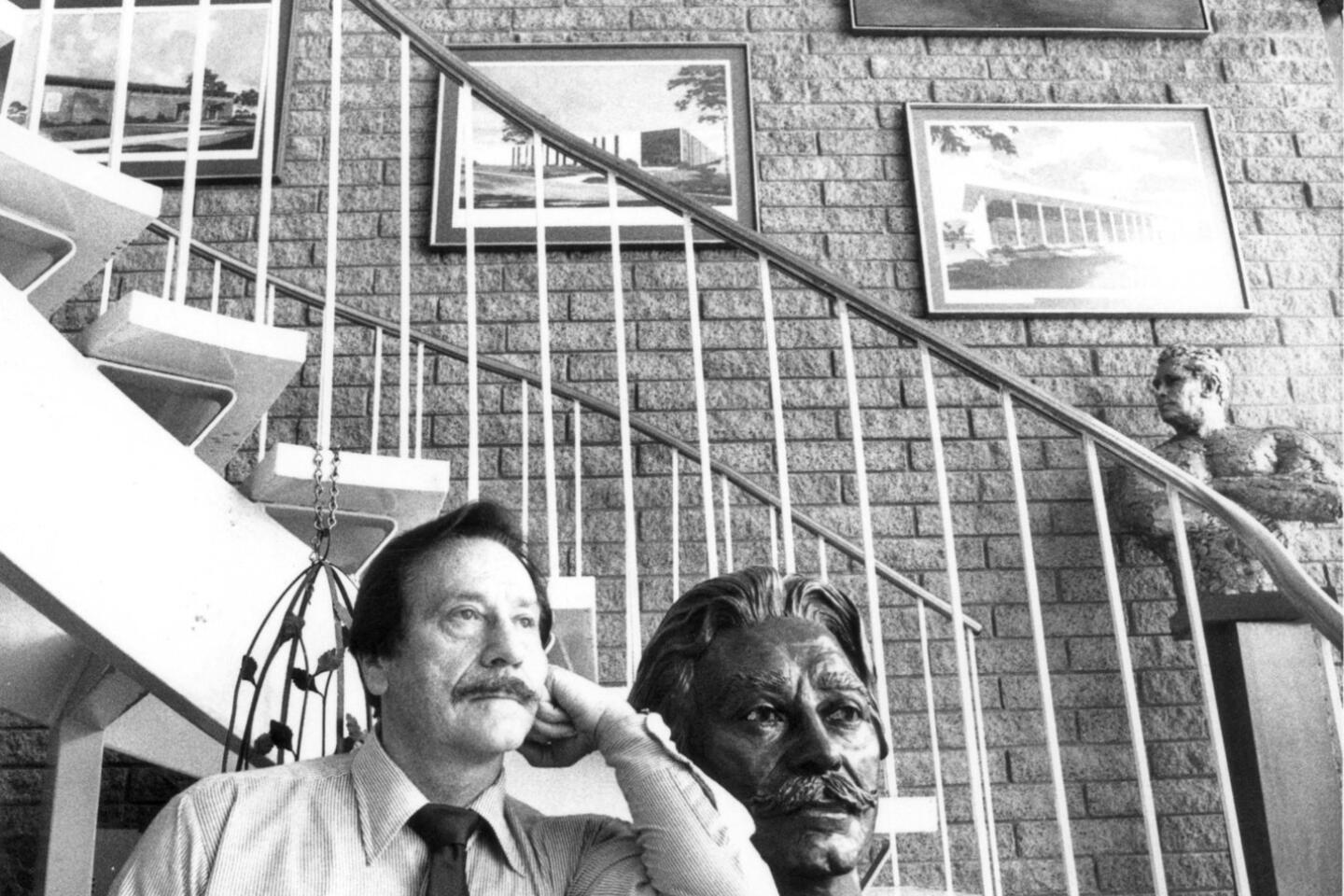Joe Weider dies at 93; bodybuilding pioneer and publisher
- Share via
Joe Weider, a Los Angeles-based bodybuilding pioneer who created a multimillion-dollar fitness publishing empire and mentored a young Arnold Schwarzenegger from the time the future actor and California governor was a struggling unknown, died Saturday, a family spokeswoman said. He was 93.
Weider, who discovered a teenage Schwarzenegger at a bodybuilding contest in Europe and sponsored the young Austrian’s move to the U.S., died of heart failure at a Los Angeles hospital, said Charlotte Parker, his longtime publicist.
A masterful marketer, entrepreneur and promoter with a rags-to-riches — and scrawny-to-brawny — story of his own, Weider had a faith in the power of bodybuilding that he compared to a religious fervor. He popularized the sport worldwide, riding the health and fitness wave with such publications as Muscle & Fitness, Flex, Men’s Fitness and Shape, which was for women.
PHOTOS: Notable deaths of 2013
“When you push yourself to the limit in the gym, you begin to get feelings of vigor and power and self-esteem,” he told a visitor in 1989, as quoted in the New York Times. “Body builders don’t walk on their powerful legs — they float. They actually feel a little sorry for the average person, struggling to feel worthwhile, wasting his vitality, watching his body deteriorate.”
On Saturday, Schwarzenegger mourned the loss of a man he called a father figure.
Weider “was the godfather of fitness who told all of us to ‘Be Somebody with a Body,” the former governor said in a statement. “He taught us that through hard work and training we could all be champions.”
Joseph Weider was born Nov. 29, 1919, in a tough section of Montreal, where his parents struggled to make a living. His father worked as a pants presser in a factory, and at age 12, Weider left school to work, first as a grocery delivery boy and later as a short-order cook.
To keep from being threatened by neighborhood toughs, Weider made his first barbells out of scrap metal and began lifting weights. He became obsessed with muscle-building and at 17, over the objections of his mother, started his first magazine, a newsletter he printed on a mimeograph machine.
He soon convinced a major magazine distributor to put the publication, Your Physique, on newsstands and sales took off. In 1946, he and his younger brother Ben hosted the first Mr. Canada contest and formed the International Federation of Bodybuilders the same night.
In 1965, Weider created one of bodybuilding’s premiere events, the Mr. Olympia competition, later adding other contests that drew weightlifters from around the world.
In 1972, recognizing that the sport needed a charismatic star, he paid for Schwarzenegger’s move to California, setting him up in a Santa Monica apartment, paying him a weekly $100 stipend and splashing his victories across the covers of his magazines.
Weider, who taught Schwarzenegger about business, also helped him land his first movie role in the 1969 film “Hercules in New York,” by telling producers the Austrian weightlifter was a German Shakespearean actor — “even though I barely spoke English,” the former governor said in his statement.
Other young bodybuilders Weider mentored and promoted included Lou Ferrigno, then an unknown from New York, who went on to stardom as television’s “The Incredible Hulk.” In 1976, Ferrigno moved west at Weider’s request to train for the Mr. Olympia contest, but said Weider encouraged him to audition for the television show.
“I knew … that sooner or later people would recognize that the human body is the highest form of art,” Weider told The Times in 1989. “We were building champions, we were beginning to run shows all over. Arnold came on the scene; Lou Ferrigno came on the scene. These guys were bigger than life.... Bit by bit, it began to catch on.”
While he had staunch supporters, he also had critics, who complained about his outsized ego and bruising business style. Weider at times called himself the Jesus Christ, the Gandhi and the Karl Marx of his field.
At its height, Weider’s muscle magazine included 16 publications, with a combined circulation of 4 million copies a month. In 2003, he sold the magazines to American Media Inc. for $357 million.
He is survived by his wife, Betty Weider, who for many years wrote a fitness column for one of his publications.
More to Read
Start your day right
Sign up for Essential California for the L.A. Times biggest news, features and recommendations in your inbox six days a week.
You may occasionally receive promotional content from the Los Angeles Times.







